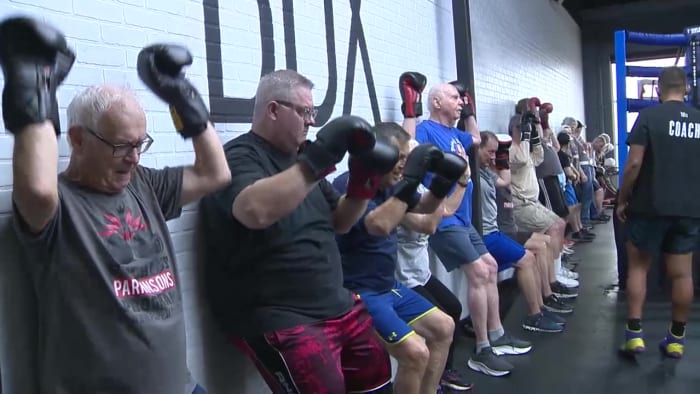SAN ANTONIO – Michael Shelburne was diagnosed with Parkinson’s disease in 2017. When he discovered his Parkinson’s Boxing program, he immediately joined Punch Out.
“Exercise is said to be the only way to slow the progression of Parkinson’s disease,” Shelburne says.
Parkinson’s disease is a terminal neurological disease that causes tremors and decreased physical, vocal, and mental function.
“If you don’t use it, you lose it. You have to be proactive,” said Henrik Palme, who takes the class every week.
Palme, who was also diagnosed seven years ago, believes boxing classes will help slow the progression of the disease.
Diane Johnson, co-founder of PunchOut Parkinson’s Disease, is a registered nurse who has been treating movement disorders for 25 years.
“I learned about boxing when I went to a conference and said, ‘When I retire, this is what I want to do.’ So I went to Indiana and trained,” Johnson said.
She said boxing is particularly suitable for Parkinson’s disease because it requires great exercise and increases the dopamine that patients lose.
“You have to extend your arms. You have to raise your legs and get your heart rate up. Getting your heart rate up is important,” Johnson said.
Co-founder Raul Garza said their program consults with local doctors.
“The doctors we work with are movement disorder specialists, and we only have five or six in San Antonio. They’re neurologists, but they’re also specialists with special training.” Garza said.
Boxing coaches are experts in their respective fields. They are Golden Gloves coaches who develop state and regional champions.
Coach Adrian Rodriguez, who everyone calls “Coach AD,” lost a family member to Parkinson’s disease. He has been researching this disease and learning how his own expertise can help, giving his time and skills pro bono for five years.
“I started doing research and started putting together more programs, things like helping with real illnesses and dopamine, and functional things like pushing, squatting, and helping people get off the toilet or chair by themselves. I did it,” Rodriguez said.
This includes slowing the loss of vocal cord movement in people with Parkinson’s disease.
“Right now they are doing acoustic training to be able to use their voices and not to lose their voices,” Rodriguez said, explaining how their voices are slowly fading due to the disease.
The AD coach had his players count down and yell each number out loud while doing squats against the wall.
However, it’s not all physical. This time is also spent taking care of your mental health.
“They play their own music from childhood, and it takes them back to their youth and gives them a dopamine rush,” Rodriguez said.
Rodriguez said she doesn’t walk on eggshells around Parkinson’s patients, as many people do.
“Sometimes we’re brutally honest with them: ‘You’re going to walk.’ You’re not going to limp. You’re going to talk. We’re going to push you further.” “I want to hear your voice. Your voice will never be lost,” he said.
It keeps patients mentally tough, which is necessary when fighting a terminal illness.
“It’s a mental thing of, ‘I can still accomplish this,'” Shelburne said.
“It’s a terrible disease. But we can improve the situation by being proactive,” Palme said.
That’s one of the many reasons this program has expanded to 60 students.
To keep everyone safe during the pandemic, classes were held at Hardberger Park. Additionally, the Box Beat Gym, where classes are currently held, was recently renovated to accommodate such a large group.
The group has become a family full of members who truly understand each other.
“The best thing was that I met so many special people who were dealing with the same kind of things that I was going through, which made it even better,” Shelburne said. Told.
They sweat together week after week, taking a beating against a disease that will never define them.
Classes are held on Wednesdays and Fridays from 10-11 a.m. at Box Beat Gym, 4553 N. Loop 1604, suite 1209, behind the shopping center.
The Hardberger Park Ecological Center, located at 8400 NW Military Hwy, offers training from 9 a.m. to 10 a.m. Tuesdays and Thursdays.
For more information, visit the program website or call 210-374-7591. This program is free to anyone with Parkinson’s disease.
Also available on KSAT.COM
Parkinson’s disease patients consider deep brain stimulation therapy that could reduce the need for drug treatment
Copyright 2024 by KSAT – All rights reserved.


